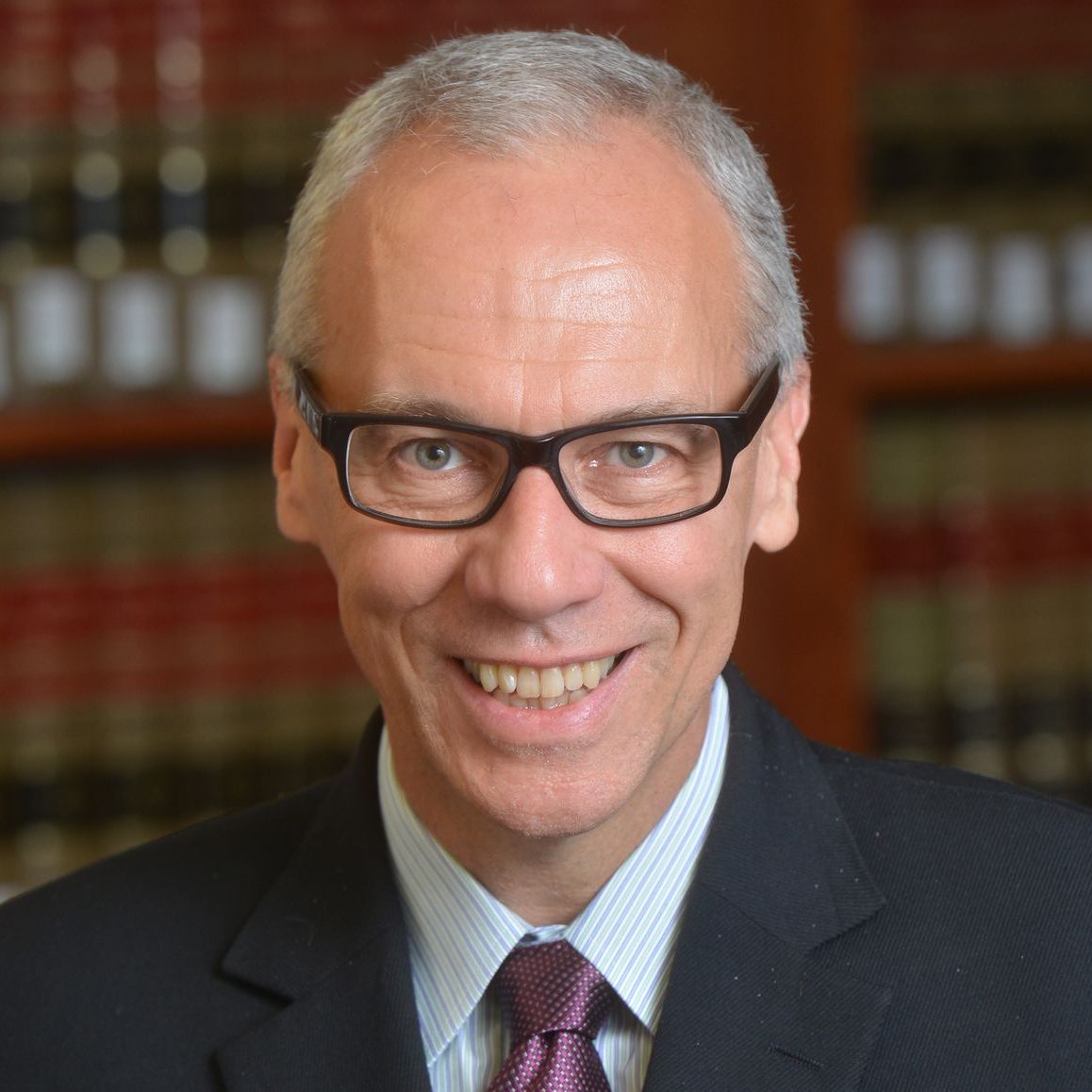Indigenous Internationalism and Kinship Diplomacy: The Relational Dimensions of Indigenous International Law
Andrew Ambers and Jeff Corntassel | Rooted: A Publication on Indigenous Law
Published in Rooted: A Publication on International Law, Vol. 3 No. 2
Enactments of Indigenous internationalism, which entail honoring relationships between nations (including plant and animal nations and other more-than-human relations) and are initiated, recalled, and reaffirmed through treaties, alliances, rights, territorial ownership and access, trade relations, and other webs of relational affiliations, contribute to and indeed constitute a diplomatic kinship meshwork. Our engagement with Indigenous internationalism is concerned with theory-building as it relates to conceptualizing kinship as a critical source of Indigenous international law and articulating how we can identify these laws and ethics in expressions of internationalism to uplift, honour, and perpetuate Indigenous sovereignty and self-determining authority. We examine how kinship meshworks order and are ordered by Indigenous international law through expressions of Indigenous internationalism, which exist beyond state borders and are functions of Indigenous diplomacies that honor Indigenous legal orders within a multiplicity of lawful and rights-bearing relations. We identify how understanding Indigenous internationalism requires overturning statist, patriarchal, and extractive visions of diplomacy, sovereignty, and international relations.
Andrew Ambers is from the Kwakwaka’wakw Nation, specifically the ‘Namgis and Ma’amtagila First Nations. He holds a Bachelor of Arts (Hons) from the University of Victoria, and he is currently a Juris Doctor (JD) and Juris Indigenarum Doctor (JID) Candidate at the University of Victoria’s Faculty of Law. Ambers contributes to various Indigenous research projects on Indigenous law, sovereignty, and Aboriginal rights, and he holds advisory role with Indigenous organizations in British Columbia. Ambers is currently working on topics related to Indigenous international law, aquatic Aboriginal Title, coastal Indigenous trade and diplomacy, Indigenous intellectual and real property rights, and the international dimensions of Indigenous rights in Canada, the United States, and beyond.
Jeff Corntassel is a writer, teacher, and father from the Cherokee Nation. As Professor and Acting Director in Indigenous Studies at the University of Victoria, his research and teaching interests focus on “Everyday Acts of Resurgence” and the intersections between Indigenous internationalisms, resurgence, climate change, gender, and community well-being. Jeff situates his work at the grassroots with many Indigenous led community-based programs and initiatives ranging from local food movement initiatives, land-based renewal projects to gendered colonial violence and protection of homelands. He is currently completing work for his forthcoming book on Sustainable Self-Determination, which examines Indigenous climate justice, food security, and gender-based resurgence.

Upholding Indigenous International Laws: Conversations on Rights, Title, and Kinship
March 14–15, 2025 | University of Victoria
This gathering of Indigenous knowledge-holders and legal scholars examined the ways that Indigenous nations and communities invoke Indigenous international law to confront ongoing colonization and assert self-determining authority. Amidst grassroots community activism as well as advancing Aboriginal title and jurisdiction, Indigenous peoples are acting on their community laws and protocols to affirm rights and title, rematriate our lands, waters and bodies, and honor kinship relations. This two-day colloquium promoted meaningful conversations around the ways that Indigenous nationhood and internationalism are practiced and adapted to confront contemporary challenges and create meaningful strategies for Indigenous nations.
Click below to view the full program.
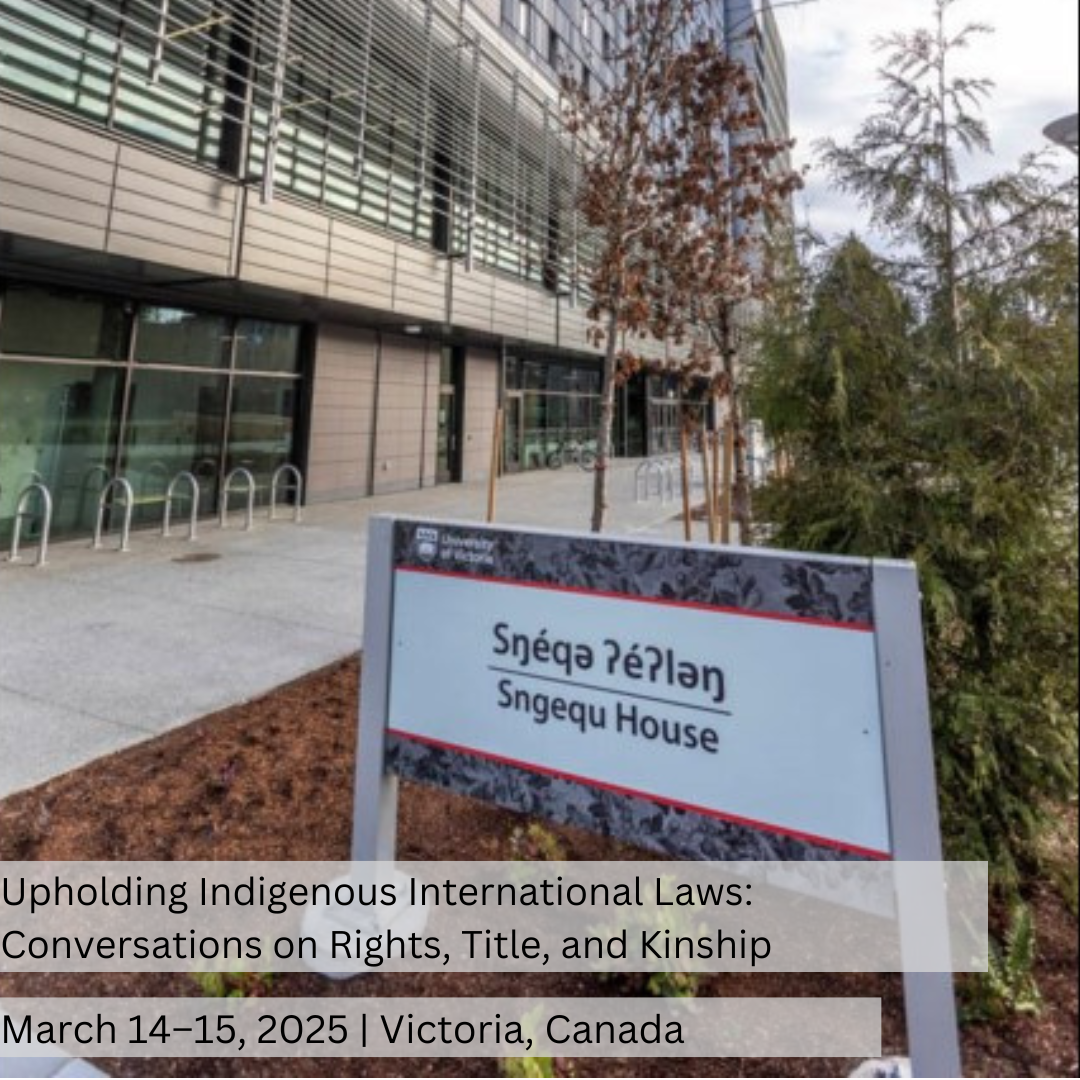
with Jeff Ganohalidoh Corntassel (Professor of Indigenous Studies at the University of Victoria, BIG Lab Co-Director) | Zoom and University of Victoria, BC | January 27, 2025
According to Anishinaabe scholar Leanne Betasamosake Simpson (2017), Indigenous peoples are “inherently international.” Indigenous nations have long engaged with other nations and non-human kin by utilizing diplomatic protocols and treaty-making. Drawing on the extensive literature around treaty-making (Deloria & DeMallie, 1999; Lightfoot & McDonald, 2017; Starblanket, 2019), UVic Professor and BIG Lab Co-Director Dr. Jeff Ganohalidoh Corntassel will compare the Buffalo Treaty (2014) and the recent implementation of the Five Tribe Wildlife Management Reciprocity Agreement (2024) in Oklahoma in terms of the ways that they expressed solidarity and Indigenous international law. The Buffalo Treaty was first signed between eight Blackfoot Nations on both sides of the U.S./Canadian border to honor their sacred relationship to buffalo. Recently at the 10th Anniversary of the signing of the Buffalo Treaty, it was pointed out that over fifty Indigenous nations have become signatories to this important treaty, which is a powerful expression of Indigenous international law.
See below for a recording of Jeff’s talk.
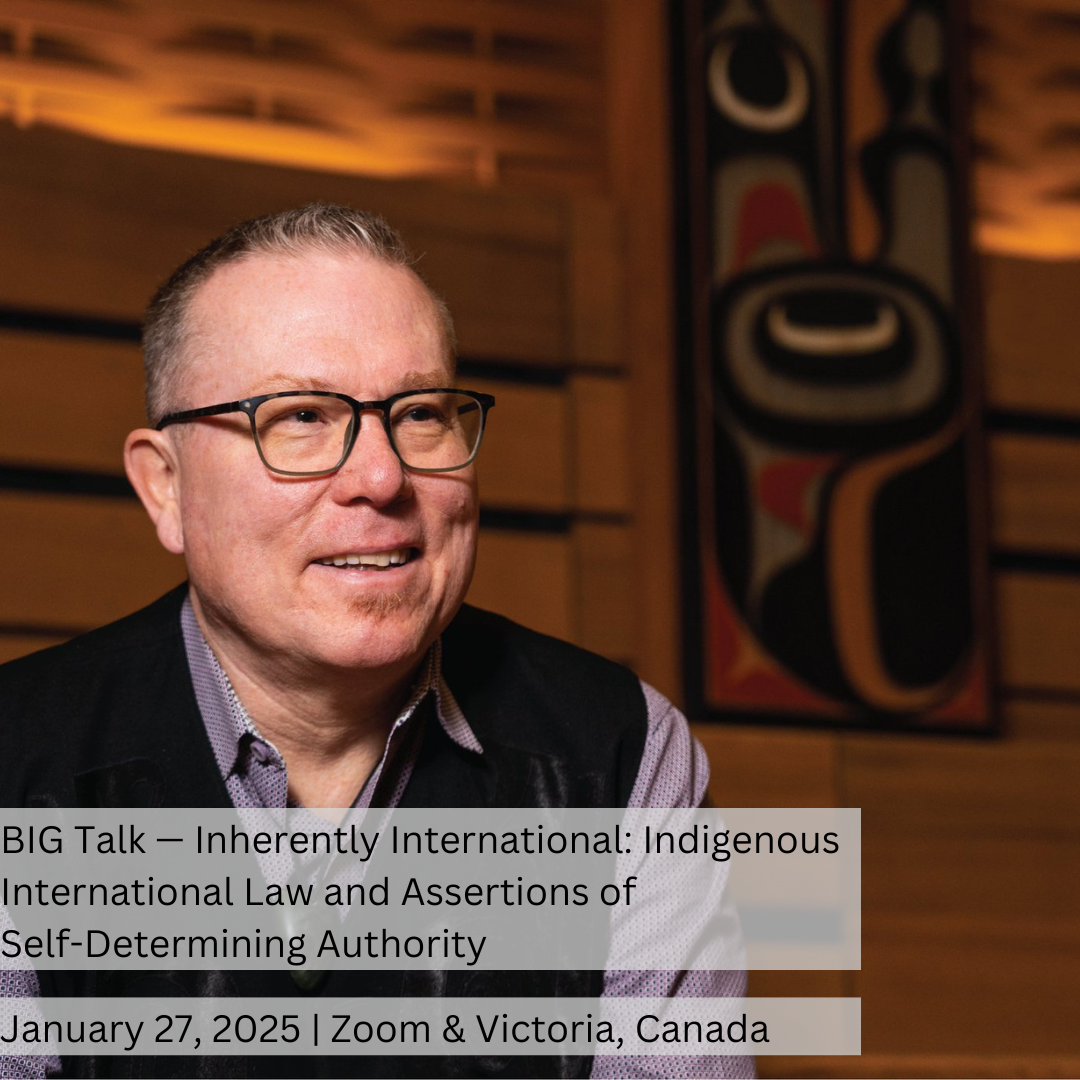
BIG Indigenous Speaker Series — Internationalism: De-theorizing Indigenous (Australia) relationality in Water reform diplomacy
featuring Dr. Virginia Marshall (Australian National University)
Join us on Tuesday, September 9th at 3pm (PST) for a special talk from Dr. Virginia Marshall: ‘Indigenous Internationalism: De-theorizing Indigenous (Australia) relationality in Water reform diplomacy’.
Virginia Marshall is a Research Fellow based at the Australian National University’s School of Regulation and Global Governance. She is a practicing lawyer and leading legal scholar with expertise in Aboriginal water rights, native title rights in Sea Country, Indigenous governance and the intersection of Traditional Knowledge systems and western intellectual property regimes, especially as it relates to Indigenous commercialization of traditional medicines.

Senior Fellow of Practice – Bordermap Consulting
Martin Pratt
Martin Pratt is an internationally-respected expert in boundary-making, border management and territorial dispute resolution. Prior to establishing Bordermap Consulting, which works to support international boundary-making and territorial dispute resolution around the world, Martin served as Director of Research at Durham University’s renowned International Boundaries Research Unit (IBRU). Martin specialises in geographical and technical aspects of boundary-making, but his expertise combines geography, international law, history, geopolitics and cartography. He has worked with more than forty governments and international organisations involved in boundary negotiations and third-party dispute resolution before the International Court of Justice, the International Tribunal for the Law of the Sea and international arbitral tribunals. He has also advised numerous oil and gas companies, pipeline layers, shipping companies, law firms and publishers.
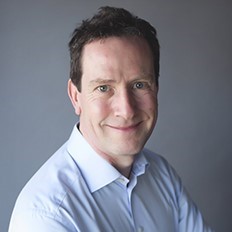
with Irasema Coronado, Ph.D. (Director and Professor School of Transborder Studies, Arizona State University) and Hector Antonio Padilla Delgado (Professor of Political Science, Universidad Autonoma de Ciudad Juarez) | Zoom and University of Victoria, BC | 10AM PST, April 28, 2025
As shifting migration policies and enforcement at the U.S.-Mexico border have rendered the pursuit of the American Dream increasingly inaccessible, a growing number of migrants have turned to Mexico as a place of permanent settlement rather than transit. This paper examines the experiences of 24 migrants from diverse national backgrounds who, after being unable to enter the United States, have made Ciudad Juárez their home. Drawing on qualitative interviews, the study explores processes of integration through interrelated domains: navigating Mexican immigration laws and policies, employment, housing, and the experiences of children in the immigrant integration process. The findings illuminate how migrants navigate local systems and construct new senses of belonging in a context marked by uncertainty, opportunity, and resilience. In documenting these lived experiences, the paper proposes a redefinition of the “Mexican Dream” as a framework emerging from migrants’ own narratives—one rooted in stability, community, and the pursuit of a dignified life in Mexico. This research contributes to broader discussions on south-south migration, urban integration, and the transformation of Mexico’s role within regional migration systems.

featuring a keynote from Writer and Co-Producer Aaju Peter
Join us on Friday, March 14th @ 7pm at Cinecenta for a screening of Twice Colonized and a keynote with Writer and Co-Producer Aaju Peter!
Renowned Inuit lawyer Aaju Peter has led a lifelong fight for the rights of her people. When her son suddenly dies, she sets out to reclaim her language and culture after a lifetime of forced assimilation.
No need to register in advance! Entry is by donation (recommended $5–15).
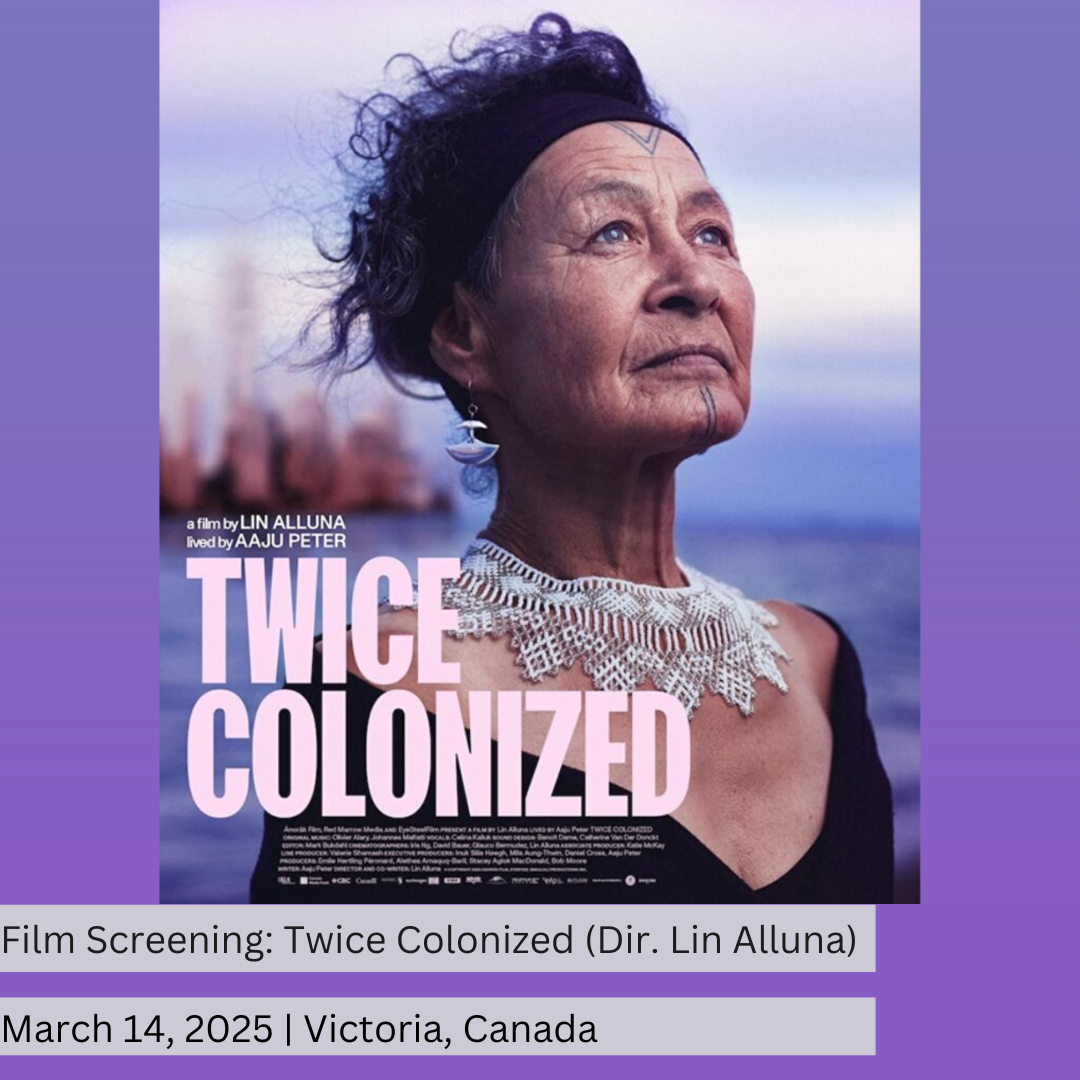
Distinguished Resident Fellow – University of Victoria
Ted Parson
Edward A. (Ted) Parson is Dan and Rae Emmett Professor of Environmental Law and Faculty Director of the Emmett Institute on Climate Change and the Environment at the University of California, Los Angeles. Parson studies international environmental law and policy, the societal impacts and governance of disruptive technologies including geoengineering and artificial intelligence, and the political economy of regulation. Parson leads the AI Pulse program at UCLA Law, and organized the 2019 Summer Institute on AI and Society. His articles have appeared in scientific and scholarly journals in a wide range of fields, including Science, Nature, Climatic Change, Future, Issues in Science and Technology, the Journal of Economic Literature, and the Annual Review of Environment and Resources. His most recent books are The Science and Politics of Global Climate Change (with Andrew Dessler) (3rd ed. Cambridge, 2019), and A Subtle Balance: Evidence, Expertise, and Democracy in Public Policy and Governance, 1970-2010 (McGill-Queens University Press, 2015). His 2003 book, Protecting the Ozone Layer: Science and Strategy (Oxford), won the Sprout Award of the International Studies Association and is widely recognized as the authoritative account of the development of international cooperation to protect the ozone layer.
Parson has led and served on multiple advisory committees, for the National Academy of Sciences, the U.S. Global Change Research Program, and other national and international bodies. His work was influential in establishing the World Commission on Climate Overshoot, for which he serves as a senior advisor. He was formerly Joseph L. Sax Collegiate Professor of Law and Professor of Natural Resources and Environment at the University of Michigan, and spent twelve years on the faculty of Harvard’s Kennedy School of Government. In addition to his academic positions, Parson has worked and consulted for the White House Office of Science and Technology Policy, the Office of Technology Assessment of the U.S. Congress, the Privy Council Office of the Government of Canada, and the International Institute for Applied Systems Analysis (IIASA). He holds degrees in physics from the University of Toronto and in management science from the University of British Columbia, and a Ph.D. in Public Policy from Harvard. In former lives, he was a professional classical musician and an organizer of grass-roots environmental groups.
